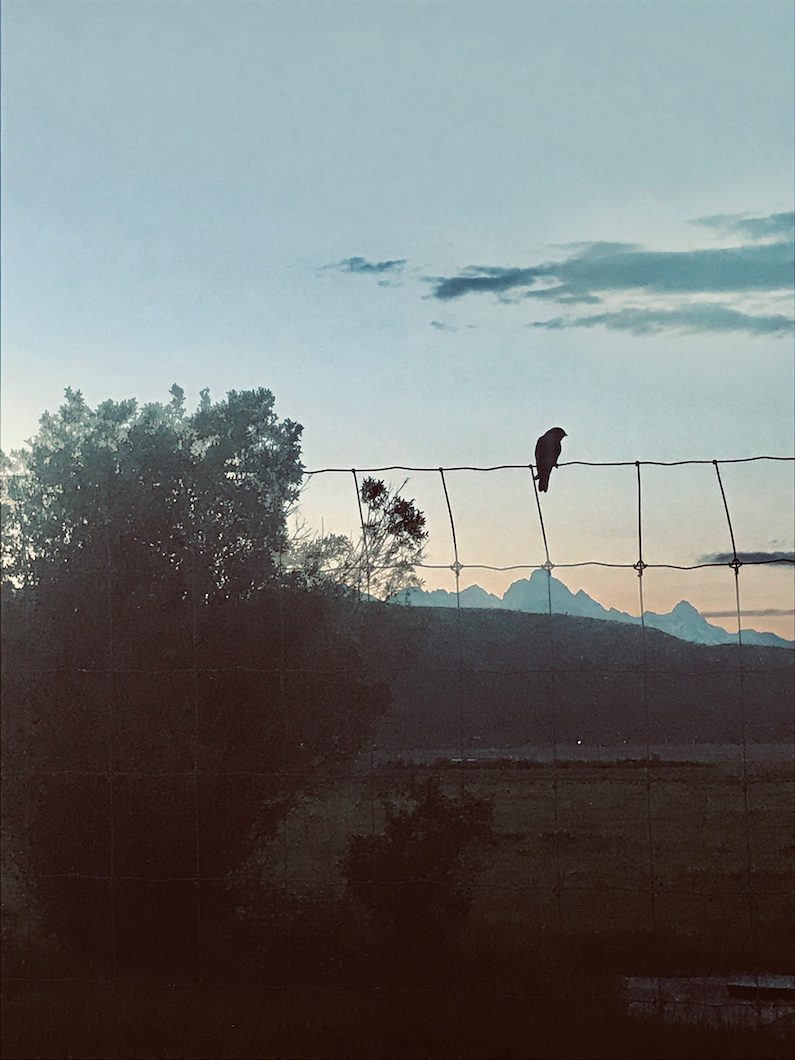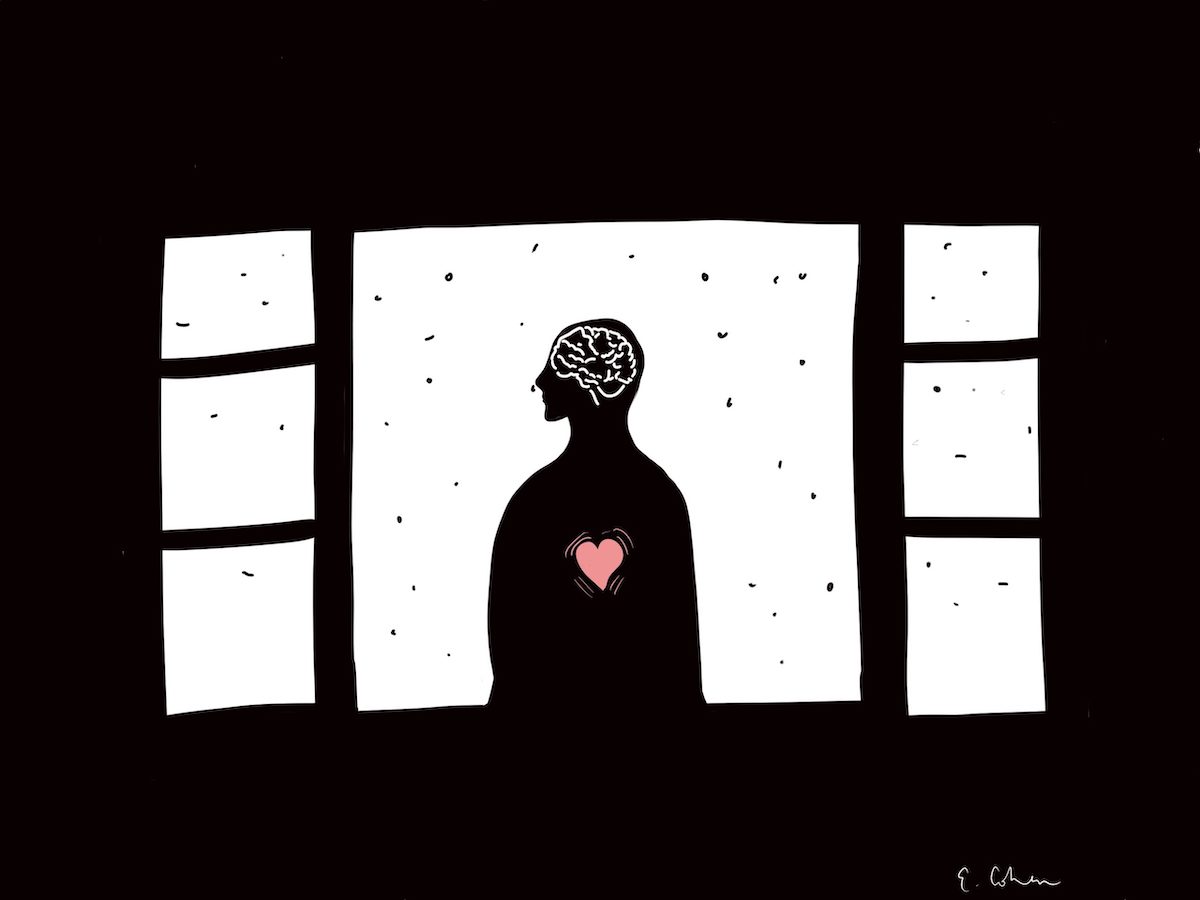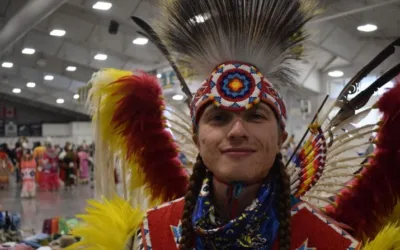When Jeremy Weiss learned that his employer, Fine Dining Restaurant Group, was temporarily closing their restaurants in response to the COVID-19 pandemic, he panicked.
“I’ve dealt with anxiety and depression my whole life, but I had my first full blown panic attack after the meeting where we decided to close the restaurants,” Weiss said.
That means Weiss was dealing with chest pain, heart palpitations, dizziness, shortness of breath and stomach upset.
He left the meeting and went home to binge-watch Netflix movies for several hours to calm himself down. Not only was he worried about his own future —his roommates are moving out and housing is unstable— but he also felt concern for his coworkers.
By Monday, however, he was back at work. He said talking honestly about anxiety is helpful for him— and others. “Being open about it is a good thing,” he said. “It’s part of destroying the stigma.”
The COVID-19 pandemic is deepening mental health issues for those who suffer from anxiety and depression. But it is also spurring new anxiety in a lot of other folks too. Teton County mental health providers say they are prepared to help community members as the crisis unfolds.
Solidarity, Connection are Key
According to local mental health experts, having a sense of solidarity, staying connected to loved ones, and reaching out for help are key to shoring up one’s mental health.

St. John’s Health offers a mental health resource line to connect callers with counselors, therapists, psychologists, and other mental health resources. It is a “warmline” rather than a crisis line, meaning calls are returned within 24 hours.
Long said she and fellow mental health providers in the county are responding in real-time to the evolving situation. “We will be learning more and more about how we as a mental health workforce can band together and support our community,” she said Monday.
The Jackson Hole Community Counseling Center is making necessary preparations to continue their services to the community. Executive Director Deidre Ashley said she anticipates calls to the center to increase in the coming weeks.
“Right now, people are in action mode,” she said. But as weeks of stress and social distancing draw out, the need for mental health support will become more acute. “People community-wide are facing a huge unknown,” Ashley said. “They don’t know what to expect.”
After a countywide shutdown of nonessential services was enacted Wednesday, the pressure on small businesses and the self-employed is mounting. Financial worries are leading to greater levels of anxiety as people wonder how they will support their families. (To address this, the Jackson Hole Community Foundation and One 22 are working with nonprofits and folks who are struggling.)
Esperanza Lopez Cruz is a mother of three. She owns a small cleaning business employing several women. All of her clients canceled their cleaning appointments this week.
“I’m feeling worried about what’s going to happen,” she said. “What if I can’t pay my employees who need money for their families? We don’t have insurance, so what if we get sick? It’s going to be a big problem for us and our children.”
Lopez Cruz’s concerns highlight the need for mental health services for Spanish speakers. As noted in the resource section below, the national Substance Abuse and Mental Health Services Administration offers counseling via text for Spanish speakers. Text “Hablanos” for Spanish to 66746.
The Jackson Hole Community Counseling Center, which offers services in Spanish and English, remains in operation but most services are shifting to phone or telehealth. Walk-in crisis services are available, although Ashley encourages people to call first. “We are following all the public health guidelines regarding disinfecting surfaces and social distancing,” she said.
In addition to telehealth services available through the counseling center, St. John’s Health, and private practitioners, there are a number of mental health resources available online and via text.
Long recommended the 24/7 national nonprofit Crisis Text Line for moments of crisis. The services are free and confidential, and easy to use, Long said. Simply text “CRISIS” to 741741 to be connected via text to a crisis counselor in Wyoming. “I tried it the other day and it worked beautifully,” she said.
Ashley suggested the free app MyStrength. It has a section dedicated to mental wellness during COVID-19. To sign up using the counseling center access code, go to MyStrength.com and click the “sign up” icon. That will take users to a page asking for an access code. Use “JHcommunity.” From there, users are directed to the content they need. All activity will remain completely anonymous, though Ashley does receive information about how many people use the service.
But, Ashley cautioned that MyStrength is not meant to replace therapy. People should use it to access resources such as mindfulness exercises. “It’s a great resource if you are having a panic attack in the middle of the night.”
“When people go crazy and buy out everything in stock at the supermarket, they are not leaving enough for people like me who will need to work long hours many days in a row and can’t make frequent trips to the store.”
An employee at the hospital who wanted to remain anonymous due to what she perceives as “increased stigma directed at healthcare workers” amid the COVID-19 outbreak, said that she had a near panic attack the other day. However, the anxiety was not necessarily about the nature of her work. “I don’t feel afraid of the virus,” she said. “I’m not afraid to go to work. I feel very well taken care of by my employer.”
Instead, she feels concerned about the public response to COVID-19, especially panic buying. “When people go crazy and buy out everything in stock at the supermarket, they are not leaving enough for people like me who will need to work long hours many days in a row and can’t make frequent trips to the store.”
Another Jackson resident, who wished to remain anonymous citing stigma about mental illness in a small town, said that despite the fact she’s dealt with anxiety and suicidal thoughts at other crisis times in her life, this crisis is eliciting something different.
“The outbreak has triggered a sense of purpose, oddly enough,” she said. “I am still figuring out what that might be in regard to my community.”
She said she is managing her anxiety through exercising, taking breaks from the hourly information flow, and limiting caffeine intake.
“We live in a place where most of us can still walk outside,” she said. Virtual access to town meetings is helpful, too. “Listening to all the town and county meetings has given me hope in terms of the team that is responding to this crisis in our county.”
Compassion and Complication
Technology is a crucial tool right now, Ashley said. “Now is a great time to utilize the technology we have available to us for connecting with others. Call your loved ones and use FaceTime to see one another.”
As yoga studios around the valley use technology to switch to online classes, it’s a reminder that staying centered, breathing, and taking care of oneself are possible even from home. Counselor and yoga instructor Sarah Kline recommended breathing exercises to restore a sense of calm. (See resource list below.) “Our breath is a gift. We can use it as a tool to train our minds, hold steady, and not to go into panic.”
Of course, technology also allows people to connect through social media too. For Jacksonites, that has meant sharing concerns and resources. Facebook groups, such as “Teton County Care Mongering” have sprouted to connect volunteers to people in need of services such as grocery deliveries or basic supplies.
Jackson resident Brantley Sydnor used Facebook to express her concerns that those with alcohol issues might downward spiral at this time.
“I’m seeing lots of ‘lighthearted’ posts about people boozing their quarantined time away during this pandemic,” Sydnor wrote. “While I understand that many people can drink alcohol in a relativity balanced manner, I know for a fact that many cannot, myself included. Isolation, panic, economic turmoil, and so on is a recipe for very dangerous and fatal alcoholic drinking. If you are struggling with your drinking, please know there are many others that have been there too. You are not alone and there is a solution and freedom when you are ready.”
Local alcohol and drug counseling, treatment and prevention service provider Curran Seeley remains open, though executive director Trudy Birkemeyer Funk said they are trying to reduce foot traffic. Monday and Tuesday groups were suspended, with the intention of holding group meetings via Zoom for the rest of the week. They also intend to do telehealth sessions.
“We feel that we need to stay open and available for our clients,” Funk said. “Don’t hesitate to call.”
She stressed that their crisis line remains open 24/7. She also encouraged clients to consider Curran Seeley’s online 30-day sober challenge. “That’s a place to learn meditation skills, start a chat with others, and stay connected to recovery and to the agency.”
A Message to Cut through the Isolation
“You are not alone,” is the resounding mantra from mental health providers in the valley. Ashley recommended staying up-to-date on news, but also taking a break and coming up with pleasurable activities. Being prepared combined with virtual social connections will bolster mental health.
And ultimately, people should derive reassurance from social distancing and self-isolating, however lonesome, to slow the spread of COVID-19, Ashley said. “There is science behind the preventative measures we are taking as a society. The things we are putting in place will create less of a total crisis.”
Humans, after all, like to have a sense of control. “Feeling like we have a plan and are prepared as individuals and a community gives us a little bit of that control back.”
Mental Health Resources
Jackson Hole Community Counseling Center
St. John’s Health Mental Health Resource Line
CrisisTextLine.org Text “CRISIS” to 741741
Substance Abuse and Mental Health Services Administration (SAMHSA)
Disaster Distress Helpline: 800-985-5990 or text “TalkWithUs” for English or “Hablanos” for Spanish to 66746
Breathing Exercises from Sarah Kline
Victory Breath
- Sit in a relaxed position with a straight spine, hands should be relaxed on your lap, eyes can be open or closed
- Inhale deeply through your nose and hold your breath
- Press the underside of your tongue to your upper palate
- Repeat in your mind, “victory, victory, victory”
- Exhale slowly through your nose
- Repeat for three minutes
Four-Part Breath
- Inhale in through your nose for a count of four, exhale through the nose for four counts
- Round or pucker your lips and breathe in slowly through the mouth for at least four counts, exhale out of the mouth with lips relaxed for the same amount of counts
- Inhale slowly through the nose, exhale slowly through the mouth
- Round your lips and breath in slowly through the mouth, then exhale slowly through the mouth
- Repeat for a few minutes






